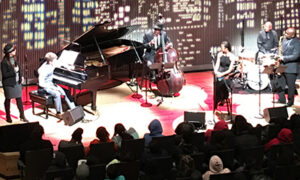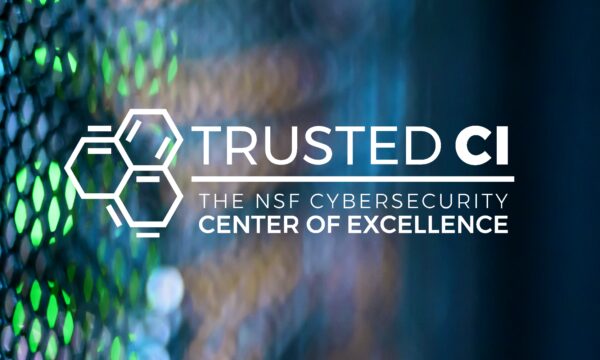- About
- Network
- News
- Initiatives
- Events
- Publications
- Blog

SFJAZZ Collaborates with K–12 Schools and Public Libraries Using CalREN
Categories Cultural & Scientific K-12 Libraries RENS & NRENS
Cultural, scientific, and artistic institutions enrich communities across California. Recognizing the contributions these organizations make to the creation and dissemination of knowledge, CENIC has begun adding them to the CalREN network. They join as sponsored associates through their close relationships to charter associates, one of which serves as a sponsor. Sponsored associates have direct access to an abbreviated portfolio of CENIC’s networks and services.
Cultural institutions have always had a dual mission: artistic creation and/or scientific discovery, and public engagement through formal and informal educational endeavors. High-speed broadband can provide worldwide access to the resources of these institutions, assisting them in fulfilling their missions by breaking down geographic, financial, and infrastructure barriers.
SFJAZZ
SFJAZZ was one of CENIC’s first sponsored associates, connecting to CalREN in February 2014, and using its 1-Gbps connection to reach audiences in public schools and libraries. Prior to its connection to CalREN, SFJAZZ had only 50 Mbps of connectivity; its connection is now 20 times faster.
For its first use of high-speed broadband, SFJAZZ created a cyber-symposium focused on the work of pianist and jazz legend Mary Lou Williams (1910-1981). This cyber symposium was a collaboration between eight educational and cultural institutions: the University of Michigan, Harvard University, Emory University, Columbia University, the University of Pittsburgh, the Kennedy Center, and the Guggenheim, in partnership with SFJAZZ. High-speed broadband allowed participants to use music collaboration software and video conferencing to explore and celebrate the life of this great American artist. The national symposium, streamed live and archived at music.pitt.edu, featured improvised duets by pianists in studios hundreds of miles apart, a portion of a work-in-progress film on Williams, and panel discussions with university scholars.
In October 2015, SFJAZZ built on this work by live streaming a concert of the award-winning SFJAZZ Collective k,, from the SFJAZZ Center to several audiences in the San Mateo County Library System. The two-way high-speed connection over CalREN allowed remote audiences and musicians to see and hear one another and to exchange ideas in real time. The matinee, part of SFJAZZ’s "Exchanges from the Stage" series, featured performing artists from the SFJAZZ Collective — an all-star, award-winning ensemble made up of eight of the finest performers and composers at work in jazz today.
"The CENIC Gigabit network has, for the first time, enabled SFJAZZ to begin to realize its vision of sharing the spontaneity and art of jazz with new audiences that might not otherwise be exposed to this art form,” said Mount V. Allen, III, director of operations for SFJAZZ.
Cultural Education
In honor of Black History Month, SFJAZZ Education’s School Day Concert program presented award-winning bassist and bandleader Marcus Shelby and his quintet on February 8, 2017. Shelby curated an interactive look at a rich tapestry of songs celebrating Harriet Tubman and the Underground Railroad. Over 800 students from 11 San Francisco Bay Area schools attended in SFJAZZ's Miner Auditorium, while another 470 students engaged digitally from their school sites across California thanks to CalREN.
Both the onsite and remote audiences exchanged call and response with the performers. As students sang along to the music inspired by activist and freedom fighter Harriet Tubman, featured vocalist Tiffany Austin brought Tubman’s struggle to life through music. Shelby explained how music was used as a strong vehicle for communication, and how spirituals, as well as other forms of music during the era leading up to Emancipation, contained secret codes that helped enslaved African Americans seek their freedom.
“The underground railroad can be thought of as the first regional network designed to support the emancipation of a disenfranchised community in the United States,” said Mount Allen. “By developing pathways for educational and cultural collaboration, CENIC provides a framework for a 'virtual' underground railroad. CENIC and its member institutions confront the digital divide in support of global literacy, not unlike the role of the underground railroad in establishing a networked path to freedom.”
Student Engagement
Teachers were enthusiastic about the opportunity. “I am thrilled that our students were able to ‘attend’ a professional, live jazz workshop/American history lesson — without having to pay for transportation costs to San Francisco or missing an entire day of instruction! The fact that it was a rainy, windy day made the option of joining from our cozy band room even more appealing,” said Jay Robert, band teacher at Toby Johnson Middle School in Elk Grove.
"It was an amazing educational and musical experience for our students. They were so excited to participate in the call and response and to recognize the names of the famous jazz musicians mentioned in the concert," added Mercy Hwong, a teacher at Preuss Middle School in San Diego.
“My favorite part about the SFJAZZ video conference was that we could ask questions because it was live,” said seventh-grader Sydney Boone.
“Being able to interact with Marcus and his band members has expanded my knowledge of jazz culture,” noted seventh-grader Ben Chuong.
Classmate Emily Chen added, “I’m glad I got to see a live professional group work with improvisation, which is something I’ve been trying to get better at.”
“SFJAZZ is committed to working with CENIC to develop new ways to deliver educational content and programs and foster research collaborations that take full advantage of the benefits of high-speed broadband access,” said Allen. “SFJAZZ’s approach is providing critical leadership in this area and can stand as a model for other performing arts organizations in California and beyond. By using high-speed broadband to engage under-resourced populations across California, SFJAZZ embraces the opportunity to collaborate with California public schools and libraries and share America’s indigenous art form — jazz.”
Related blog posts
From the Ground to the Stars: Critical Big-Data Research in Africa
Learn about critical data-dependent research collaborations currently taking place in the nations of Africa, all of which require integration into the global high-performance network and cyberinfrastructure environments.
Get Your Cybersecurity Program Up and Running with the Trusted CI Framework
Learn about the Trusted CI Framework, developed by the NSF Cybersecurity Center of Excellence and created to help your scientific research facility overcome the obstacles to standing up a cybersecurity program for its cyberinfrastructure.


